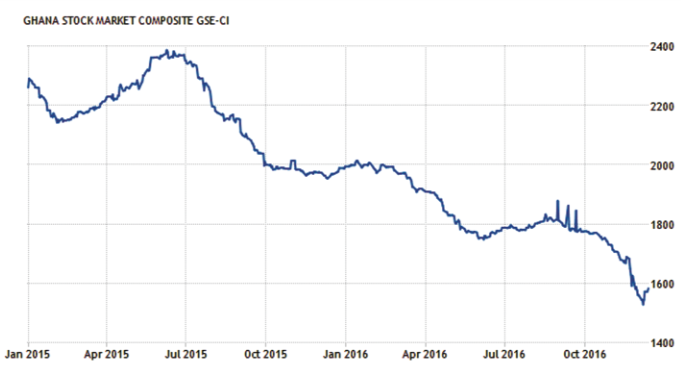
Better prospects for listed companies after years of weak performance
The Ghana Stock Exchange (GSE) is optimistic that the steady decline in inflation and Treasury bill (T-Bill) rates will combine with the peaceful change in government to lift business confidence and help reverse the negatives fortunes of the bourse as from next year.
It is expected that the positive signs at the macro level, should it continue, will stimulate growth in businesses and the economy in general, a situation which is expected to translate into strong financial results for the listed companies.
Given that the performance of the exchange is tied to the operations of the listed companies and the economy, the Managing Director of the GSE, Mr Kofi S. Yamoah, said a rebound on business activities after a bearish showing in the past two years would help to lift the market indices from their current state to a more positive level.
After registering negative returns in 2015 and 2016, Mr Yamoah said in an interview last Tuesday that the current conditions showed that the bourse was about to shake off the bearish showing and revert to positive performance, come 2017.
“This is the second year of negative return for the equity market. Hopefully, with interest rates trending downwards, inflation going down and the general election successfully conducted and a new government expected to take office soon, we expect to see a better 2017 and going forward,” he said, adding: “This is on the back of the fact that should interest rate and inflation continue to trend downwards and the stability continue in the foreign exchange rate market, the performance of companies will pick up and that will also affect the performance of the exchange,” the MD of the GSE said.
Negative returns
Last year, return on the GSE was 11.77 per cent, making it the fourth worse performer in Africa after the Egyptian CASE 30, the Nigerian Stock Exchange and the Mauritius SEMDEX.
The sluggish performance of the exchange was a clear reflection of the lackluster performance of the listed companies, whose growth capabilities were weakened by a combination of factors, including the fiscal slippages, a tight monetary stance and the power challenges that marred business operations in 2015.
Although the economic challenges improved this year, the performance of the GSE was the least impressive, with year-to-date (YTD) return ending the first nine months of the year at negative 10.86 per cent.
Total shares traded also fell by 44.8 per cent to 64.4 million as of September 14, this year, compared to 116.4 million in the same period last year.
As of December 13, this year, return on the bourse had worsened to negative 21.21 per cent in the midst of a declining excitement among shareholders on the market.
While admitting that the situation was a clear reflection of the lackluster performance of the listed companies, Mr Yamoah said evidence showed that a successful change in government always brought excitement to events on the market.
“In other jurisdiction where there have been exciting elections and changes in government, the euphoria of the population naturally brings a new dispensation in terms of lifting the economy up and then boosting the performance of the companies.
“So, if what we have seen in some jurisdictions is anything to go by, then we will naturally want to expect it here in the country,” he said.
While admitting that the same excitement and euphoria greeted the change of government in 2009, when the then National Democratic Congress (NDC) beat the governing New Patriotic Party (NPP) in the general election, Mr Yamoah said remnants of the 2008 global financial crises suppressed the impact it would have had on the bourse.
“It is something we always see. We even saw it in 2009 but the coincidence with the 2008 crises made it difficult for us to feel the real impact. Going forward, we hope that it will be better this year,” he said.
A strong performance of the GSE, which will reflect in the annual return of the bourse, will lead to increased trade, excitement on the market and share price appreciations.
This will then inure to the benefit of shareholders on the equity market.